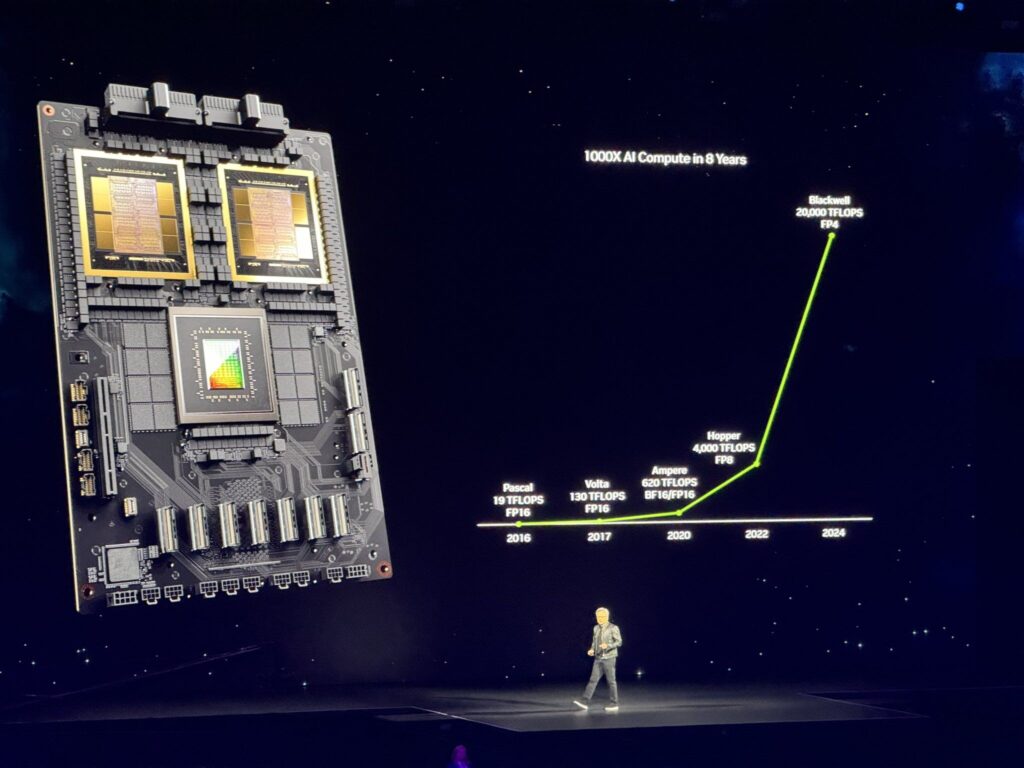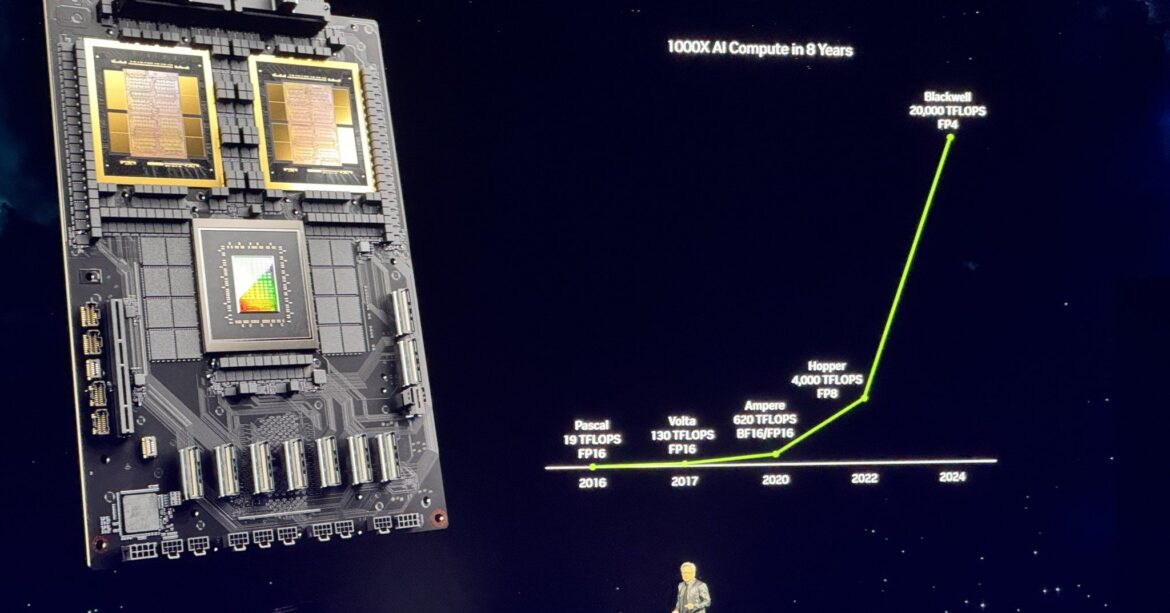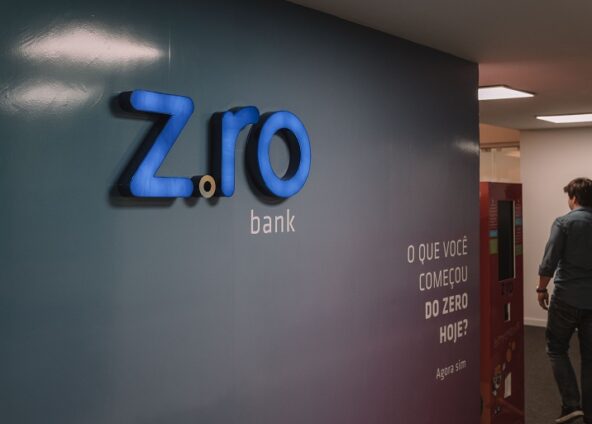We have entered a new era of Artificial Intelligence (AI). Moore's Law, which predicted the doubling of processing power every two years, has been challenged by exponential advances. Graphics processing giant NVIDIA recently announced its new chip architecture, the Blackwell, promising to drive the next industrial revolution with a quantum leap in performance.
The Twilight of Moore's Law and the Rise of 1,000X AI
Moore's Law, formulated in 1965 by Gordon Moore, co-founder of Intel, dictated the pace of technological evolution for decades. Therefore, the prediction was that the number of transistors in an integrated circuit would double every two years. In other words, leading to exponential increases in computational power. However, in recent years, the limits of miniaturization have become increasingly evident, making maintaining Moore's Law a challenge.
It is in this context that the AI 1,000X. While Moore's Law traditionally delivers improvements in 10x every five years, NVIDIA's Blackwell architecture delivers an impressive increase in 1,000x in performance compared to chips launched eight years ago. This represents a paradigmatic shift in information processing, paving the way for a new era of artificial intelligence.
The Power of Blackwell Architecture: AI with Trillions of Parameters
The performance leap provided by Blackwell is not just theoretical. It translates into unprecedented capabilities for AI. State-of-the-art machine learning models currently operate with hundreds of billions of parameters. OpenAI's GPT-3, for example, has 175 billion parameters. With the Blackwell architecture, however, NVIDIA paves the way for the development of models with 10 trillion parameters.
This colossal amount of parameters makes it possible to create much more accurate and sophisticated AI models. Imagine systems capable of translating languages with cultural nuances that are imperceptible to current automatic translators. Or, computational visions that recognize complex objects and patterns with human precision. AI 1,000X promises to revolutionize sectors such as healthcare, finance, manufacturing and retail, generating disruptive solutions and optimizing processes in an unprecedented way.
Economic Impact of 1,000X AI: A Transformed Future
Finally, the advent of 1,000X AI is not limited to technological advancement. In other words, it has enormous potential to impact the global economy. A McKinsey Global Institute study estimates that AI can inject up to US$ 15 trillion in the world economy by 2030. This growth will come from several fronts, including:
- Increased productivity: AI will automate complex tasks, freeing up the workforce for more strategic activities. This will lead to significant productivity gains across several sectors.
- Better decision processes: Advanced AI models will assist in business decision-making, optimizing resource allocation, pricing and marketing strategies.
- Development of new products and services: AI 1,000X will enable the creation of innovative products and services, driving the emergence of new markets and industries.
- Improved operational efficiency: AI will optimize logistics, supply chain and energy management processes, reducing costs and waste.
Furthermore, 1,000X AI has the potential to solve some of today's major global challenges, such as climate change, poverty and disease. The development of sustainable AI systems can contribute to the creation of renewable energy sources, the efficient management of natural resources, and the improvement of medical diagnostics and treatments.

The Future of AI: Challenges and Opportunities
The arrival of 1,000X AI opens up a horizon full of possibilities, but it also presents challenges. It is necessary to discuss issues such as ethics in AI, the impact on the job market and the regulation of the use of this technology.
However, the potential benefits are immense. 1,000X AI has the power to drive human progress at a pace never seen before. It is up to us, as a society, to prepare ourselves to take advantage of the opportunities and mitigate the risks inherent to this new era of artificial intelligence.
Challenges to be faced:
- Ethics in AI: It is crucial to ensure that AI is used ethically and responsibly. In other words, avoiding discriminatory biases and guaranteeing data privacy.
- Impact on the job market: Automating tasks may lead to the loss of some jobs, but it will also create new opportunities in areas such as software development, data analysis and AI engineering.
- AI Regulation: Governments and international organizations will need to establish regulatory frameworks to ensure the responsible use of AI and prevent abuse.
Opportunities to be explored:
- Increased productivity and efficiency: AI can automate repetitive and complex tasks, freeing up time and resources for more strategic and creative activities.
- Better decisions: AI models can analyze large volumes of data and provide valuable insights to aid decision-making in various sectors.
- New products and services: AI paves the way for the creation of innovative products and services in areas such as healthcare, education, transportation and agriculture.
- Solutions to major global challenges: AI can be used to tackle problems such as climate change. In other words, poverty and disease, through the development of sustainable and efficient solutions.
Preparing for the Age of 1,000X AI:
- Education and training: It is essential to invest in education and training of the population so that people are able to work with AI and take advantage of the opportunities it offers.
- Research and Development: It is necessary to continue investing in AI research and development so that technological advances continue at a rapid pace.
- Dialogue and collaboration: Governments, businesses, academia and civil society need to work together to ensure that AI is used ethically and responsibly, to the benefit of all.
The Age of 1,000X AI is just beginning. The implications of this technology for the future of humanity are vast and not yet fully understood. It is essential that we prepare for this new era with caution, but also with optimism, seeking to make the most of the potential of AI for the good of society.
Conclusion on AI 1,000X
AI 1,000X represents a quantum leap in the development of artificial intelligence, with the potential to revolutionize several sectors of the economy and society. It is important that we are aware of the challenges and opportunities that this new era presents, and work together to ensure that AI is used ethically and responsibly, for the benefit of human progress.
With information from @ Zain Kahn


